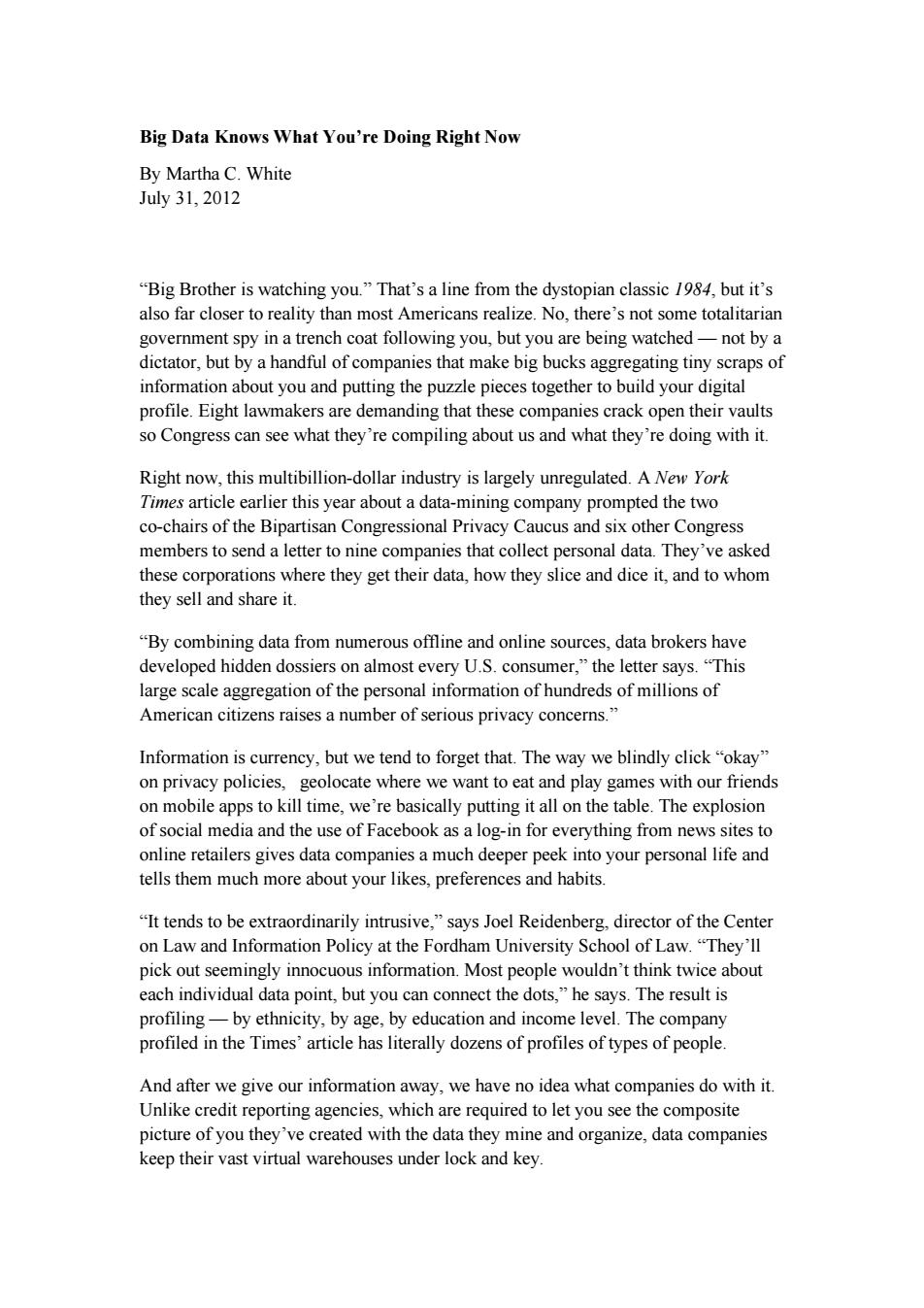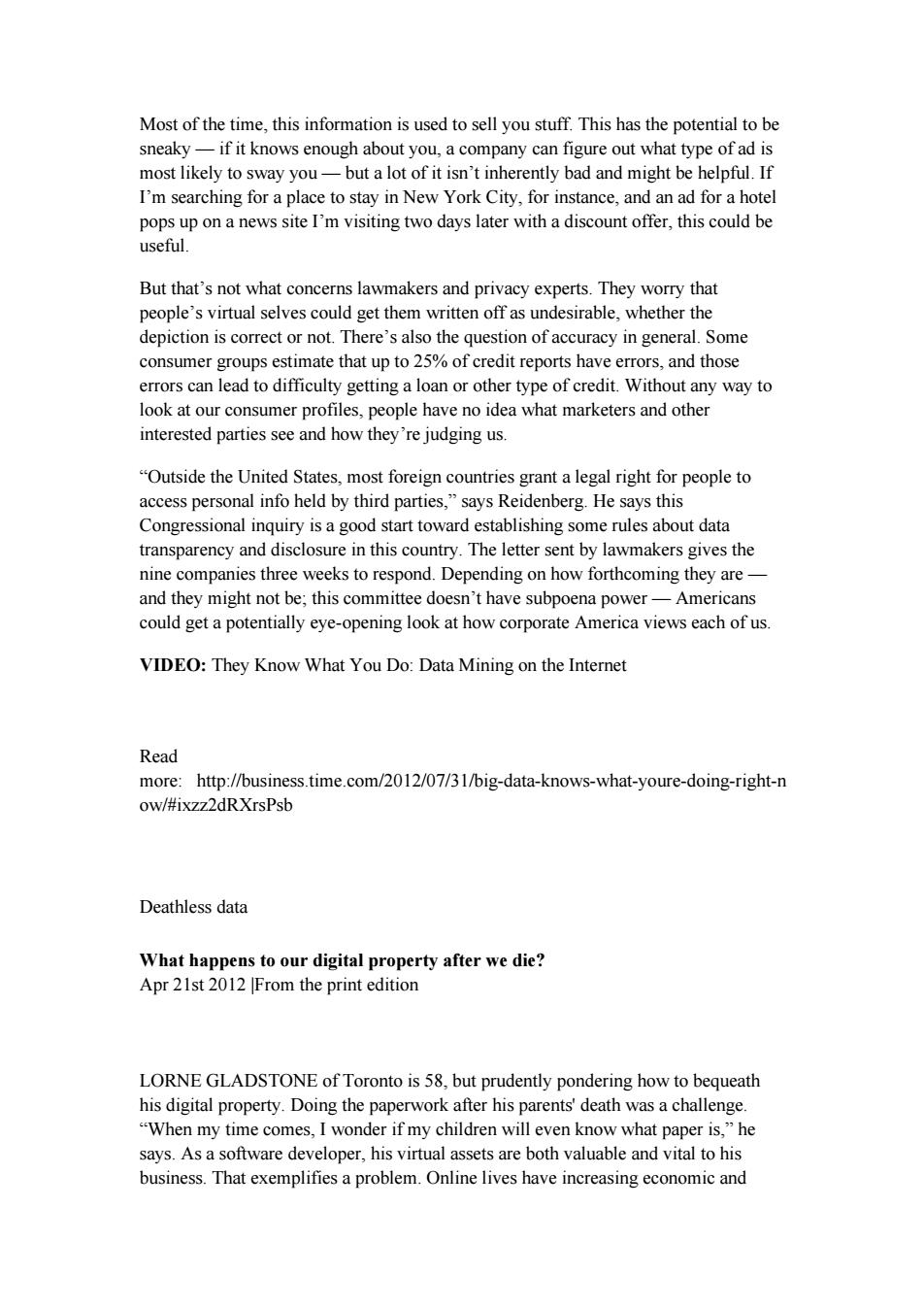
Big Data Knows What You're Doing Right Now By Martha C.White July31,2012 "Big Brother is watching you."That's a line from the dystopian classic 1984,but it's also far closer to reality than most Americans realize.No,there's not some totalitarian government spy in a trench coat following you,but you are being watched-not by a dictator,but by a handful of companies that make big bucks aggregating tiny scraps of information about you and putting the puzzle pieces together to build your digital profile.Eight lawmakers are demanding that these companies crack open their vaults so Congress can see what they're compiling about us and what they're doing with it. Right now,this multibillion-dollar industry is largely unregulated.A New York Times article earlier this year about a data-mining company prompted the two co-chairs of the Bipartisan Congressional Privacy Caucus and six other Congress members to send a letter to nine companies that collect personal data.They've asked these corporations where they get their data,how they slice and dice it,and to whom they sell and share it. "By combining data from numerous offline and online sources,data brokers have developed hidden dossiers on almost every U.S.consumer,"the letter says."This large scale aggregation of the personal information of hundreds of millions of American citizens raises a number of serious privacy concerns." Information is currency,but we tend to forget that.The way we blindly click "okay" on privacy policies,geolocate where we want to eat and play games with our friends on mobile apps to kill time,we're basically putting it all on the table.The explosion of social media and the use of Facebook as a log-in for everything from news sites to online retailers gives data companies a much deeper peek into your personal life and tells them much more about your likes,preferences and habits. "It tends to be extraordinarily intrusive,"says Joel Reidenberg,director of the Center on Law and Information Policy at the Fordham University School of Law."They'll pick out seemingly innocuous information.Most people wouldn't think twice about each individual data point,but you can connect the dots,"he says.The result is profiling-by ethnicity,by age,by education and income level.The company profiled in the Times'article has literally dozens of profiles of types of people And after we give our information away,we have no idea what companies do with it. Unlike credit reporting agencies,which are required to let you see the composite picture of you they've created with the data they mine and organize,data companies keep their vast virtual warehouses under lock and key
Big Data Knows What You’re Doing Right Now By Martha C. White July 31, 2012 “Big Brother is watching you.” That’s a line from the dystopian classic 1984, but it’s also far closer to reality than most Americans realize. No, there’s not some totalitarian government spy in a trench coat following you, but you are being watched — not by a dictator, but by a handful of companies that make big bucks aggregating tiny scraps of information about you and putting the puzzle pieces together to build your digital profile. Eight lawmakers are demanding that these companies crack open their vaults so Congress can see what they’re compiling about us and what they’re doing with it. Right now, this multibillion-dollar industry is largely unregulated. A New York Times article earlier this year about a data-mining company prompted the two co-chairs of the Bipartisan Congressional Privacy Caucus and six other Congress members to send a letter to nine companies that collect personal data. They’ve asked these corporations where they get their data, how they slice and dice it, and to whom they sell and share it. “By combining data from numerous offline and online sources, data brokers have developed hidden dossiers on almost every U.S. consumer,” the letter says. “This large scale aggregation of the personal information of hundreds of millions of American citizens raises a number of serious privacy concerns.” Information is currency, but we tend to forget that. The way we blindly click “okay” on privacy policies, geolocate where we want to eat and play games with our friends on mobile apps to kill time, we’re basically putting it all on the table. The explosion of social media and the use of Facebook as a log-in for everything from news sites to online retailers gives data companies a much deeper peek into your personal life and tells them much more about your likes, preferences and habits. “It tends to be extraordinarily intrusive,” says Joel Reidenberg, director of the Center on Law and Information Policy at the Fordham University School of Law. “They’ll pick out seemingly innocuous information. Most people wouldn’t think twice about each individual data point, but you can connect the dots,” he says. The result is profiling — by ethnicity, by age, by education and income level. The company profiled in the Times’ article has literally dozens of profiles of types of people. And after we give our information away, we have no idea what companies do with it. Unlike credit reporting agencies, which are required to let you see the composite picture of you they’ve created with the data they mine and organize, data companies keep their vast virtual warehouses under lock and key

Most of the time,this information is used to sell you stuff.This has the potential to be sneaky-if it knows enough about you,a company can figure out what type of ad is most likely to sway you-but a lot of it isn't inherently bad and might be helpful.If I'm searching for a place to stay in New York City,for instance,and an ad for a hotel pops up on a news site I'm visiting two days later with a discount offer,this could be useful. But that's not what concerns lawmakers and privacy experts.They worry that people's virtual selves could get them written off as undesirable,whether the depiction is correct or not.There's also the question of accuracy in general.Some consumer groups estimate that up to 25%of credit reports have errors,and those errors can lead to difficulty getting a loan or other type of credit.Without any way to look at our consumer profiles,people have no idea what marketers and other interested parties see and how they're judging us. "Outside the United States,most foreign countries grant a legal right for people to access personal info held by third parties,"says Reidenberg.He says this Congressional inquiry is a good start toward establishing some rules about data transparency and disclosure in this country.The letter sent by lawmakers gives the nine companies three weeks to respond.Depending on how forthcoming they are- and they might not be;this committee doesn't have subpoena power-Americans could get a potentially eye-opening look at how corporate America views each of us. VIDEO:They Know What You Do:Data Mining on the Internet Read more:http://business.time.com/2012/07/31/big-data-knows-what-youre-doing-right-n ow/#ixzz2dRXrsPsb Deathless data What happens to our digital property after we die? Apr 21st 2012 |From the print edition LORNE GLADSTONE of Toronto is 58,but prudently pondering how to bequeath his digital property.Doing the paperwork after his parents'death was a challenge. "When my time comes,I wonder if my children will even know what paper is,"he says.As a software developer,his virtual assets are both valuable and vital to his business.That exemplifies a problem.Online lives have increasing economic and
Most of the time, this information is used to sell you stuff. This has the potential to be sneaky — if it knows enough about you, a company can figure out what type of ad is most likely to sway you — but a lot of it isn’t inherently bad and might be helpful. If I’m searching for a place to stay in New York City, for instance, and an ad for a hotel pops up on a news site I’m visiting two days later with a discount offer, this could be useful. But that’s not what concerns lawmakers and privacy experts. They worry that people’s virtual selves could get them written off as undesirable, whether the depiction is correct or not. There’s also the question of accuracy in general. Some consumer groups estimate that up to 25% of credit reports have errors, and those errors can lead to difficulty getting a loan or other type of credit. Without any way to look at our consumer profiles, people have no idea what marketers and other interested parties see and how they’re judging us. “Outside the United States, most foreign countries grant a legal right for people to access personal info held by third parties,” says Reidenberg. He says this Congressional inquiry is a good start toward establishing some rules about data transparency and disclosure in this country. The letter sent by lawmakers gives the nine companies three weeks to respond. Depending on how forthcoming they are — and they might not be; this committee doesn’t have subpoena power — Americans could get a potentially eye-opening look at how corporate America views each of us. VIDEO: They Know What You Do: Data Mining on the Internet Read more: http://business.time.com/2012/07/31/big-data-knows-what-youre-doing-right-n ow/#ixzz2dRXrsPsb Deathless data What happens to our digital property after we die? Apr 21st 2012 |From the print edition LORNE GLADSTONE of Toronto is 58, but prudently pondering how to bequeath his digital property. Doing the paperwork after his parents' death was a challenge. “When my time comes, I wonder if my children will even know what paper is,” he says. As a software developer, his virtual assets are both valuable and vital to his business. That exemplifies a problem. Online lives have increasing economic and

sentimental value.But testamentary laws offer muddled and incomplete ways of bequeathing and inheriting them Digital assets may include software,websites,downloaded content,online gaming identities,social-media accounts and even e-mails.In Britain alone holdings of digital music may be worth over f9 billion($14 billion).A fifth of respondents to a Chinese local-newspaper survey said they had over 5,000 yuan($790)of digital property.And value does not lie only in money."Anyone with kids under 14 years old probably has two prints of them and the rest are in online galleries,"says Nathan Lustig of Entrustet,a company that helps people manage digital estates. Service providers have different rules-and few state them clearly in their terms and conditions.Many give users a personal right to use an account,but nobody else,even after death.Facebook allows relatives to close an account or turn it into a memorial page.Gmail (run by Google)will provide copies ofe-mails to an executor.Music downloaded via iTunes is held under a licence which can be revoked on death.Apple declined to comment on the record on this or other policies.All e-mail and data on its iCloud service are deleted on the death of the owner. This has led to litigation in America.In 2004 the family of Justin Ellsworth,a marine killed in Iraq,took Yahoo!to court in Michigan to get copies of his e-mails.This year, a court in Oregon ruled that another bereaved American mother could use her dead son's password to enter his Facebook account for a short period.Now five American states have enacted laws giving executors control over the social-networking profiles of deceased users. But this raises the subject of privacy.Passing music on is one thing;not everyone may want their relatives snooping on their e-mails.Colin Pearson,a London-based lawyer, says access should come only with an explicit provision in a will. Such clearly expressed wishes may help.An internet law expert in New Delhi, Gurpreet Singh,has already seen a few cases of wills including digital estates. "People are slowly realising the value,"he says.A nascent industry is emerging to simplify the process.Entrustet,newly acquired by a Swiss competitor,SecureSafe, says it has 10,000 clients.It safeguards their passwords,and a list of who can access what when they die. But laws,wills and password safes may clash with the providers'terms of service, especially when the executor is in one country and the data in another.Headaches for the living-and lots of lovely work for lawyers. From the print edition of The Economist:International Questions about Content: 1.Does the writer acknowledge the opposing viewpoint,and does she address Questions about Organization 2.What strategy of expository development is used most in this essay?
sentimental value. But testamentary laws offer muddled and incomplete ways of bequeathing and inheriting them. Digital assets may include software, websites, downloaded content, online gaming identities, social-media accounts and even e-mails. In Britain alone holdings of digital music may be worth over £9 billion ($14 billion). A fifth of respondents to a Chinese local-newspaper survey said they had over 5,000 yuan ($790) of digital property. And value does not lie only in money. “Anyone with kids under 14 years old probably has two prints of them and the rest are in online galleries,” says Nathan Lustig of Entrustet, a company that helps people manage digital estates. Service providers have different rules—and few state them clearly in their terms and conditions. Many give users a personal right to use an account, but nobody else, even after death. Facebook allows relatives to close an account or turn it into a memorial page. Gmail (run by Google) will provide copies of e-mails to an executor. Music downloaded via iTunes is held under a licence which can be revoked on death. Apple declined to comment on the record on this or other policies. All e-mail and data on its iCloud service are deleted on the death of the owner. This has led to litigation in America. In 2004 the family of Justin Ellsworth, a marine killed in Iraq, took Yahoo! to court in Michigan to get copies of his e-mails. This year, a court in Oregon ruled that another bereaved American mother could use her dead son's password to enter his Facebook account for a short period. Now five American states have enacted laws giving executors control over the social-networking profiles of deceased users. But this raises the subject of privacy. Passing music on is one thing; not everyone may want their relatives snooping on their e-mails. Colin Pearson, a London-based lawyer, says access should come only with an explicit provision in a will. Such clearly expressed wishes may help. An internet law expert in New Delhi, Gurpreet Singh, has already seen a few cases of wills including digital estates. “People are slowly realising the value,” he says. A nascent industry is emerging to simplify the process. Entrustet, newly acquired by a Swiss competitor, SecureSafe, says it has 10,000 clients. It safeguards their passwords, and a list of who can access what when they die. But laws, wills and password safes may clash with the providers' terms of service, especially when the executor is in one country and the data in another. Headaches for the living—and lots of lovely work for lawyers. From the print edition of The Economist: International Questions about Content: 1. Does the writer acknowledge the opposing viewpoint, and does she address Questions about Organization 2. What strategy of expository development is used most in this essay?

Questions about Style 3.Comment on the quality of sentence variety in this essay. Opinions for Essay Writing 4. Paraphrase 5
Questions about Style 3. Comment on the quality of sentence variety in this essay. Opinions for Essay Writing 4. Paraphrase 5